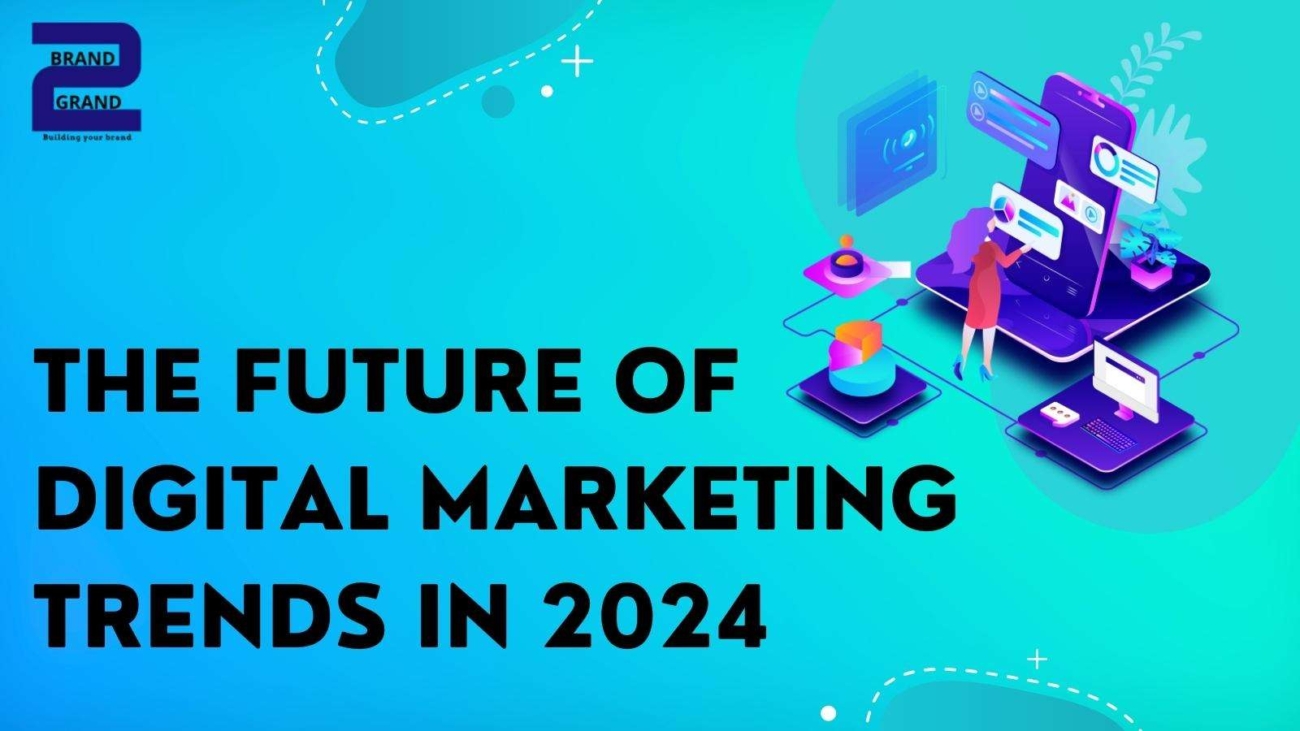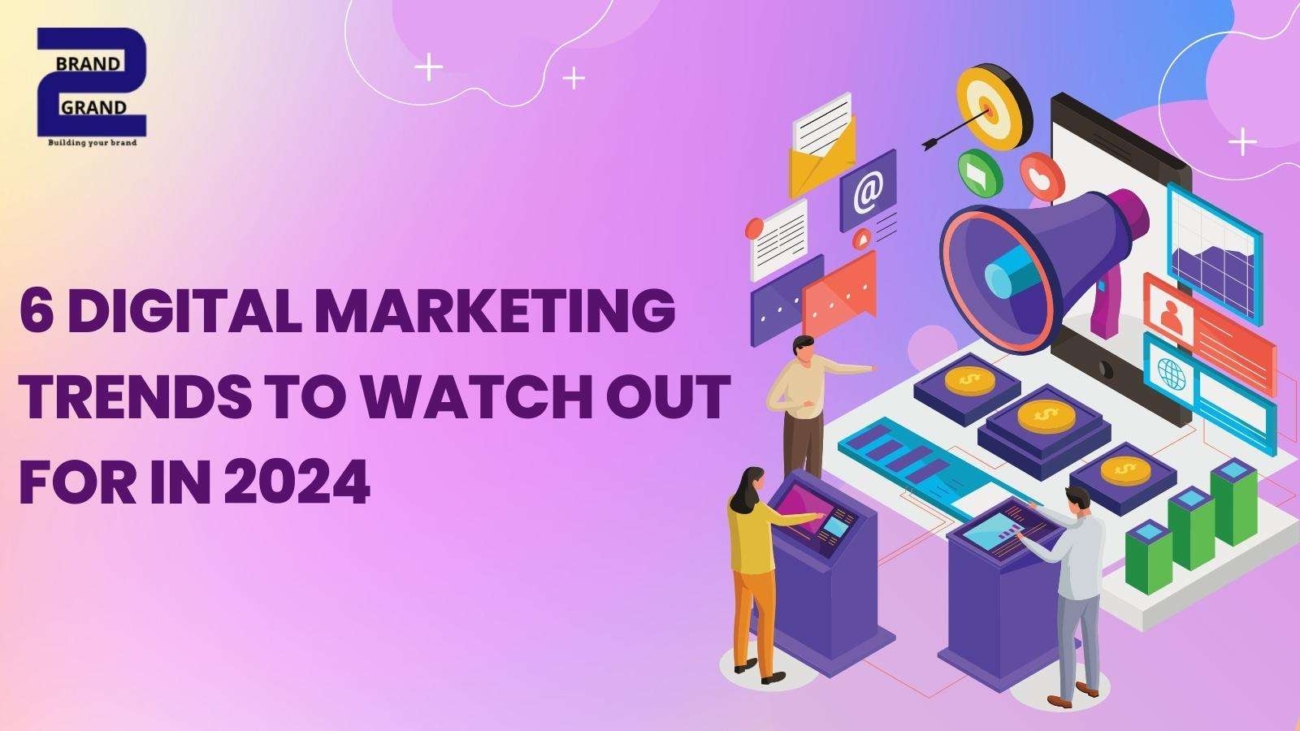As we look ahead to 2024, the digital marketing landscape is expected to continue evolving rapidly. Here are some key trends and developments that are likely to shape the future of digital marketing:
1. AI and Machine Learning Integration:- Artificial intelligence and machine learning will play an increasingly central role in digital marketing. These technologies will be used to personalize content, automate marketing processes, optimize advertising campaigns, and analyze data for better decision-making.
2. Voice and Visual Search:- Voice and visual search are expected to become more prevalent. Marketers will need to optimize their content for voice and image-based queries, which will change the way SEO and content strategies are approached.
3. Privacy and Data Regulation:- Data privacy concerns and regulatory changes will continue to impact digital marketing. Stricter data protection laws and increased consumer demand for privacy will require marketers to be more transparent in their data collection and usage practices.
4. Content Personalization:- Personalization will become more sophisticated, with brands leveraging data to deliver highly targeted content and product recommendations. Dynamic content and AI-driven personalization will create more engaging and relevant user experiences.
5. Video and Live Streaming:- Video content will maintain its dominance, with live streaming gaining further popularity. Brands will use video to tell stories, provide behind-the-scenes glimpses, and engage with their audience in real time.
6. Ephemeral Content:- The popularity of short-lived, ephemeral content on platforms like Instagram Stories and Snapchat is expected to continue. Marketers will need to harness the FOMO (fear of missing out) effect and create content that encourages immediate engagement.
7. Augmented and Virtual Reality (AR/VR):- AR and VR technologies will see increased adoption in marketing. Brands will use AR for virtual try-ons, product visualization, and interactive advertising campaigns, while VR may be used for immersive brand experiences.
8. Influencer Marketing Evolution:- Influencer marketing will continue to evolve, with a focus on micro-influencers, niche experts, and long-term partnerships. Authenticity and transparency will be crucial for successful influencer collaborations.
9. Sustainability and Social Responsibility:- Consumers will expect brands to be more socially and environmentally responsible. Brands that incorporate sustainability and ethical practices into their marketing efforts will likely gain a competitive edge.
10. 5G Impact:- The rollout of 5G technology will create opportunities for more interactive and data-intensive marketing experiences. Faster internet speeds will enable higher-quality video streaming, augmented reality applications, and more immersive digital experiences.
11. NFTs and Blockchain in Marketing:- Non-fungible tokens (NFTs) and blockchain technology may find applications in digital marketing, including digital collectibles, ownership certificates, and transparent supply chains.
12. Search Engine Changes:- Search engines will continue to evolve. As search engine algorithms become more sophisticated, marketers will need to focus on providing high-quality, relevant content and optimizing for new search behaviors and features.
Digital marketing in 2024 will require adaptability and a focus on creating meaningful and relevant experiences for the target audience while navigating an ever-changing technological and regulatory landscape. Staying updated with industry trends and emerging technologies will be essential for marketers to remain competitive in the digital space.
How to grow business in digital marketing 2024
Growing a business through digital marketing in 2024 will require a strategic and adaptable approach, given the evolving landscape. Here are key strategies to consider:
1. Understand Your Audience:-
– Conduct thorough audience research to understand their needs, preferences, and pain points.
– Create detailed buyer personas to tailor your digital marketing efforts effectively.
2. Quality Content Creation:-
– Invest in high-quality, relevant, and engaging content across various formats (text, video, audio, visuals).
– Consistently provide value to your audience to build trust and authority.
3. SEO Optimization:-
– Stay up-to-date with SEO best practices and algorithm changes.
– Focus on optimizing for voice and visual search.
– Use keyword research and on-page SEO to improve your website’s visibility in search results.
4. Personalization:-
– Leverage data and AI to deliver personalized experiences to your audience.
– Use dynamic content and tailored recommendations to engage users.
5. Mobile Optimization:-
– Ensure your website and content are mobile-friendly and load quickly.
– Optimize for mobile search, as mobile users are a significant portion of your audience.
6. Social Media Strategy:-
– Be present on the social media platforms where your audience is most active.
– Create engaging content, interact with your followers, and use paid advertising to expand your reach.
7. Email Marketing:-
– Develop a robust email marketing strategy to nurture leads and maintain customer relationships.
– Personalize email content and use automation for efficiency.
8. Video Marketing:-
– Invest in video content and live streaming.
– Use video to tell stories, demonstrate products, and connect with your audience.
9. Influencer Partnerships:-
– Collaborate with micro-influencers or industry experts to reach a wider audience.
– Ensure influencers align with your brand values and target demographics.
10. Data Analytics:-
– Use analytics tools to track the performance of your digital marketing efforts.
– Make data-driven decisions to optimize your strategies.
11. E-commerce Expansion:-
– If applicable, consider expanding your e-commerce capabilities to facilitate online sales.
– Implement an efficient and user-friendly online shopping experience.
12. Local SEO:-
– For businesses with physical locations, focus on local SEO strategies to attract nearby customers.
– Encourage customer reviews and ensure your Google My Business profile is up-to-date.
13. Sustainability and Social Responsibility:-
– Embrace sustainable and socially responsible practices and communicate them in your marketing efforts.
– Highlight your commitment to ethical and environmentally-friendly initiatives.
14. Adapt to Technological Changes:-
– Stay updated with emerging technologies like AR, VR, and blockchain that may impact your industry.
– Be ready to incorporate relevant technology into your marketing strategies.
15. Compliance and Ethics:-
– Stay compliant with data protection and privacy regulations.
– Be transparent in your data collection and usage practices.
16. Community Building:-
– Foster an online community around your brand.
– Engage with your audience on social media and encourage user-generated content.
17. Test and Experiment:-
– Continuously test and experiment with different digital marketing tactics.
– Be open to trying new channels and approaches as the digital landscape evolves.
18. Invest in Training and Talent:-
– Ensure your team has the necessary skills and knowledge to implement effective digital marketing strategies.
– Consider investing in ongoing training and hiring experts if needed.
Digital marketing in 2024 will be characterized by adaptability and a strong focus on providing value and personalized experiences to the audience. Keep an eye on industry trends, stay updated with best practices, and be ready to adjust your strategies as needed to achieve business growth in the digital space.
6 Digital Marketing Trends to Watch Out For in 2024
Digital marketing is a dynamic field, and it’s important to stay ahead of the latest trends to remain competitive and effective. Here are six digital marketing trends to watch out for in 2024:
1. AI-Powered Marketing:-
Artificial Intelligence (AI) and machine learning are set to play an even larger role in digital marketing. AI can analyze vast amounts of data to provide insights, optimize ad campaigns, personalize content, and enhance the customer experience. Chatbots and virtual assistants are also becoming more sophisticated, offering better customer support and engagement.
2. Voice Search Optimization:-
With the increasing popularity of voice-activated devices like smart speakers and virtual assistants, optimizing for voice search is critical. Marketers will need to adapt their SEO strategies to accommodate natural language queries, long-tail keywords, and provide concise, informative answers.
3. Privacy and Data Protection:-
Concerns over data privacy and regulations like GDPR and CCPA are driving changes in digital marketing. Marketers will need to focus on transparent data collection, consent-based marketing, and responsible handling of customer information. Privacy-centric digital advertising strategies will become more prevalent.
4. Video Dominance:-
Video content continues to be a dominant force in digital marketing. Short-form videos, live streams, and interactive video content will be key for engaging audiences. Video SEO and shoppable videos are likely to gain prominence as well.
5. Augmented and Virtual Reality (AR/VR):-
AR and VR technologies are evolving rapidly, offering new opportunities for digital marketing. Brands can create immersive experiences, such as virtual showrooms, try-before-you-buy AR applications, and interactive advertising campaigns to engage and convert customers.
6. Sustainability and Social Responsibility:-
Consumers are increasingly conscious of environmental and social issues. Brands that embrace sustainability and social responsibility in their digital marketing efforts will likely see increased trust and loyalty. This includes highlighting eco-friendly practices, supporting social causes, and adopting ethical advertising practices.
In addition to these trends, it’s important to stay updated on shifts in social media algorithms, emerging platforms, and changes in consumer behavior. Successful digital marketing in 2024 will require agility, adaptability, and a focus on creating meaningful and relevant experiences for the target audience.



